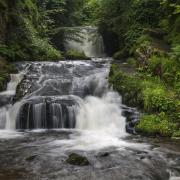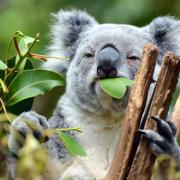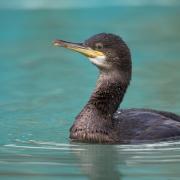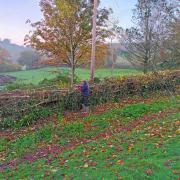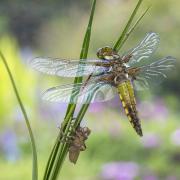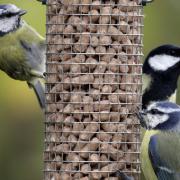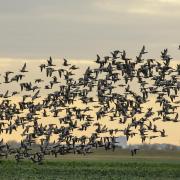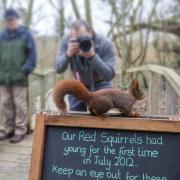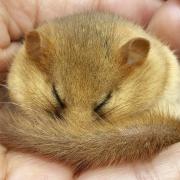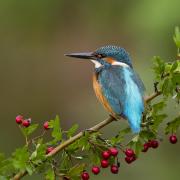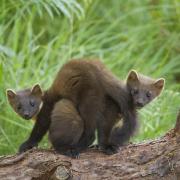Jean Rose gets up close and personal at Dartmoor Zoological Park, but one of her first encounters with the animals wasn't quite what she expected
Funny old world, isn't it? I'd not expected my day at Dartmoor Zoological Park to include witnessing the castration of a Vietnamese pot-bellied pig. The owners, however, were keen for me to take part in a typical keeper's day at the zoo, so I pounded from area to area as the staff responded to their radios. When the Mee family bought the zoo, Boris the pig appeared to have been 'done' already. But a rise in numbers in the pig enclosure proved otherwise. Boris needed further attention.
When I first set eyes on the portly Boris, he was semi-sedated, staggering and slip-sliding around his territory. When the anaesthetic finally took hold, however, and he slumped to the ground, it was time for him to be eased into a wooden crate, transferred to a van, and driven 200 yards to the new, gleaming Vets' Room on site. Tony Wright, head of maintenance, was on hand to help with lifting. Boris finally lay on the operating table - 150 kilos of brown-black jelly pudding, swaying as he was turned over. His nether regions were liberally swabbed and an oxygen mask went neatly over his snout. The operation then went according to plan, the vet discovering the offending organs tucked up inside the animal and in a none-too-healthy state; so better out than in. Boris is now back to his normal self.
Good modern conservation
Duncan Mee explained to me that castration was important to put a stop to inbreeding, which weakens a species and makes the progeny unusable for the subsequent rearing of stock. Some of the zoo's Siberian tigers had been inbred before the Mees took over, and they'd also been hand-reared, which had caused them to show signs of domestication. Duncan stressed that good modern conservation aims to rear animals who are true to their species. This means that a wild cat will stay wild. So Vladimir, Blotch and Stripe will live out a relaxed retirement at the zoo without being able to produce new tigers.
Conservation now also includes what's known as animal enrichment. This means that an animal's life in a zoo should be as similar as possible to that which it would experience in the wild. A lion, for example, needs to use both its intelligence and a specific range of muscles when stalking and capturing its prey. Therefore, Solomon and Josie will sometimes have their meat hung on the branch of a tree, so they then have to use all their ingenuity and agility to get hold of it.
Improving the animals' diets has been central to improving their health and wellbeing. Anna Westbury, the animal collection manager, showed me a barn full of crates of fruit and veg (past their sell-by dates) donated by local supermarkets. "We have to be careful with bananas," she explained, "because they contain a lot of sugar. But they're very useful when one of the animals has to take some medicine."
High standards of breeding and careful management of genetics are essential in good conservation practice. Segregated in a block near the Vets' Room, Kiruna, a female lynx, has been in quarantine. She's on loan from another zoo, and she will soon be allowed out and introduced to Finn, the resident female. By then, a new up-market enclosure will be ready for them both, and, in due course, a gentleman friend will arrive.
New developments for March
March will see the opening of a new, purpose-built education centre behind the zoo shop. This will house a classroom with live exhibits such as millipedes, snakes and tarantulas, as well as fossils and bones showing evolution. So there will be plenty of new experiences for visitors from Easter onwards. Daily talks have been taking place since last summer's opening of the zoo, and by the spring there will also be new activity sheets for kids, prepared in accordance with the National Curriculum. I watched Tony Fitzsimmons preparing some of the wonderful new visitor fact sheets that are being displayed on each enclosure; Tony is responsible for the sensitively drawn cartoon figures of the animals.
Education is central to work at the zoo, from the primary key stages up to post-graduate level. Anna plays a key role in education. Her background includes a Masters degree in animal biology and she currently oversees eight students from Plymouth University who are writing their final-year dissertations. She also keeps meticulous daily records of goings-on at the zoo. "I deal with births, marriages and deaths," she says, laughing. Like other staff, Anna seems to do a bit of everything. She particularly enjoyed coping with the logistics of transferring Tammy (the tiger who had not been getting on with her sister, Tamsin) to her new home at a French zoo.
A heart-in-the-mouth job
Steve Pilcher, the curator, is responsible for sedating animals before they are moved. He must judge the amount of sedative needed, but the science for this, he explains, is less than precise. "Animals don't always react as you expect," he says. A tricky problem occurred with Tammy, the tiger. It was Steve who had to creep up to the only partly sedated tiger and fire a second dart to stun her - clearly a heart-in-mouth job because she could have rallied at any moment.
"Dartmoor Zoological Park has strong links with Paignton and Newquay zoos," explains Steve, who spent 15 years at Jersey Zoo and another year-and-a-half at Newquay before coming to DZP. The zoos can pool knowledge and loan animals for breeding. Steve oversees the diet and welfare of the animals (there are well over 200), the animal collection plan and the design of enclosures. He also makes sure that DZP adheres to the UK's voluminous and very strict legislation on zoos. He had risen at some ungodly hour on the day of my visit, but, like everyone here, he's wedded to his work. "It's not work to me," he says.
The sense of commitment and enjoyment here is palpable. Adam Taylor, the zoo manager, had previously worked for a small family firm and he says it was "like coming home" when he arrived to work at DZP. Adam runs the marketing side of the business as well as being responsible for the shop and refurbished restaurant.
A family concern
The family itself is made up of brothers Ben and Duncan, their delightful mother Amelia, and Ben's two small children. When I expressed surprise at their ability to take on a project that none of them has any experience of, Amelia tells me they've always been a practical family, and that Ben has written books on DIY. "You soon learn," says Ben. He goes on, "Duncan's interest in animals rubbed off on me at an early age."
Ben's interests have centred on the question of whether animals can think. For his degree in psychology, he wrote his dissertation on dolphin intelligence. "Dolphins," he says, "use humour, which is a high-level thought process." He explains that to characterise animals as sentient beings would raise difficult questions over their rights in the UN charter, although apes have already been granted certain rights in New Zealand.
Ben's dream is to have African Bonobo chimps at the park. Thought to be the cleverest of the chimps, some of them have been taught sign language. He certainly envisages having a primate section at DZP in the future and hopes, one day, "to see giraffes against the skyline." Steve has dreams for the future too. His include a tropical house for amphibians - he has a penchant for poison arrow frogs - and small cat species that need protection.
I'd been keen to see the bears, and I was taken along by Jo Parr, the book-keeper, who seemed just as excited to be here as everyone else. It was dull and raining and the bear enclosure seemed deserted, but Jo called out, and soon, a svelte figure with a beautiful chocolate-coloured coat appeared from its wooden hut. "That's Ben," she said. "He's always inquisitive." With a new, improved diet, the three bears have each lost around
12 stone in weight since the Mees arrived; and as I returned to the office, I met Anna brandishing 'before' and 'after' photos of Hayley, the bear. "Slimmer of the year!" she proclaimed.
Ironically, the Mees had no plans to work with animals when the agents sent details of the zoo. They were merely looking for a large property in the south of England. Their vision, however, together with their determination to improve the lives of the animals, has made them ideal custodians. And visitors have confirmed that the animals now look more relaxed and happier too. I'm tempted to conclude that the zoo itself had been putting out feelers to draw in the Mees.
Dartmoor Zoological Park, Sparkwell, Plymouth, is open daily 10am-4pm until 31 March when it will be open 10am-6pm. (01752 837645, www.dartmoorzoo.co.uk



